Uncertainties Around Charters’ Special Ed Role
Elaine Meyer | Jul 30, 2009 | Comments 7
One Family’s Legal Struggle
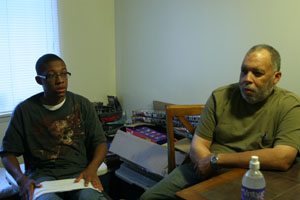
Jaleel, who was expelled from a charter school, and his father Franklin at home in Washington, D.C. (PHOTO: PAUL STEPHENS/NEWS21)
By Elaine Meyer with additional reporting by Paul Stephens
Like many District of Columbia parents, Renell and Franklin F. were pleased to have the option of enrolling their 16-year-old son Jaleel in one of the city’s many charter high schools instead of one of the rougher public high schools in their neighborhood in Anacostia. For nearly two years, Jaleel attended the Capitol Hill campus of the Cesar Chavez Public Charter School, where he earned As and Bs. (The family has declined to use their last name to protect their privacy).
More importantly, his parents said he had a mood disorder, and that school officials were well aware of it. When the family met with an education attorney after Jaleel’s expulsion, they were told that the school should have evaluated Jaleel for a special education plan, because counselors and teachers had let principals know of Jaleel’s difficulties many times. Instead, Renell and Franklin, who are divorced, had to go to court to get their son an evaluation. As the legal process escalated, Jaleel, who enjoyed academics and the graphics club at Chavez, remained out of school.
“We didn’t know what our options were really,” said Renell. “We don’t even know if he will be allowed to go the 11th grade.”
The conundrum is all too common in the District of Columbia public school system, known for the exceptionally large number of special education violations filed against it. Jaleel’s parents believed charter schools were supposed to be intimate havens for innovative education, a refuge from the troubles of other public schools–not business as usual.
But now Renell and Franklin find themselves struggling against the D.C. public schools juggernaut that they had tried to avoid, since Cesar Chavez School, is represented by District of Columbia education attorneys because it is technically part of D.C.’s school district for special education purposes. After multiple requests by phone or email, Cesar Chavez School declined to comment on any part of the story, which was communicated by Daniel Kim, the school’s attorney.
The District has long had trouble serving its 12 percent of students with special education needs. Now that charter schools’ enrollment has taken over one-third of the public school population, many parents and teachers are wondering whether the new schools are up to the challenge of educating special education children.
about 13 percent or 5,720, students in special education, according to statistics from the Office of the State Superintendent of Education or O.S.S.E., the body that collects data for all District of Columbia public schools.
Most charter schools do not enroll students with a heavy load of disabilities. If such students apply, charter school officials “often” refer them elsewhere, found an ongoing study mandated by the 2006 class action cases Blackman v. District of Columbia and Jones v. District of Columbia, commonly referred together as Blackman/Jones. “Many charters cannot cope with the large numbers of students with disabilities,” the report says.
Large public high schools, on the other hand, must accept all students, except when the public system determines students needs are better met at private schools, in which case it refers them there and pays the tuition. District records show that the rates of students in special education at several of the district’s largest public high schools such as Anacostia, Ballou and Cardozo have increased in recent years, though it is unclear whether this is the result of students transferring from charter schools.
For their part, charter school officials complain that some parents do not disclose their students’ special education needs during the admissions process, presumably in order to increase the odds of their children being accepted to the charter schools, and that there are schools that are reluctant to admit special education students. “Some schools were frank to concede that they would not admit students who required a large number of hours of specialized service (16+) or had specific diagnoses they were not equipped to serve (e.g. mental retardation),” according to the Blackman/Jones report.
Amy Totenberg, the assigned court monitor for the Blackman/Jones case, said that she could not comment further on the report, except to say that it addresses the current limitations of traditional public schools as well as charter schools and that a comprehensive report for the 2008-2009 year will be released in October.
Jaleel is one of an unknown number of D.C. charter school students with special needs who never made it to the special education evaluation stage. His parents contend, and several of his counselors agreed, according to court records, that his angry outbursts in class owed to his fear of failure exacerbated by a mood disorder. As a result, the school acted rashly when it expelled Jaleel, his parents say, rather than complete the official process to give him services.
According to Jaleel’s parents, the school’s lawyers have also tried to avoid discussing an earlier episode of Jaleel’s at special education court hearings, as it is indicative that he should have gotten attention back then. In December, 2007, Jaleel became frustrated in art class because he couldn’t get his teacher’s attention to ask her what color he should use to paint a project.
That incident led his counselor to recommend that Jaleel get a psychological evaluation and to advise that the school follow up with a special education evaluation. However, the Chavez administration never went through with it.
The situation remained quiet until February of 2009, Jaleel’s sophomore year. When he saw a grade of a D on a biology quiz, he said he got so angry that his teacher ordered him to the hall to calm down. However, he said, he could not stop thinking about how the grade would send his 98 percent class average plummeting. He said he muttered violent words under his breath in the hallway, including a wish– he was just being dramatic, he says–to kill the teacher. Two other teachers overheard him and took him to the counselor’s office. Jaleel was suspended and then expelled from school that month.
How widespread are forced or unforced transfers from charter to public schools due to special education issues? It is difficult to say, since there is no data at the moment on the number of students who are expelled or pushed out from D.C.’s charter schools and back through the doors of traditional public ones. (According to the Office of the Superintendent of Special Education, statistics on transfers between charter and traditional public schools will be available this October.) But teachers in traditional District public schools report that they routinely see students with special education needs transfer into their already-overcrowded classrooms in the middle of the school year.
One special education counselor at Garfield Elementary said the school frequently enrolls transfer students from charter schools with behavioral disabilities, such as attention deficit hyperactivity disorder. That counselor, Candi Peterson, runs an anger-management program at Garfield for students with emotional disturbances.
Peterson, who runs an education blog, said she also knows of students with special education needs who have been discouraged from attending D.C. charter schools by leaders at those schools. “I have been involved in cases, where a charter school will tell parents off the top that they won’t accept them,” she said.
When students transfer from charter to traditional public schools after early fall, traditional public schools lose money. Charters and traditional public schools receive the same amount of funding per pupil at the beginning of a school year, but the money does not follow a student who transfers after November from charter school to regular public school, according to Mary Levy, an education budget expert at the Washington Lawyers’ Committee.
Kerry Sylvia, who teaches history at Cardozo High School, said she has seen charter students transferring into her high school with incomplete evaluations of their special needs. It is up to her high school to complete the rest, as well as to absorb these students in an inclusive classroom setting that current special education law requires.
“The whole thing is that we can’t turn students away,” said Sylvia. “If they’re in our boundary, we have to take them.”
Charter school advocates say that it is difficult for them, as start-up schools, to properly tend to special education students in their first difficult years of operation. A charter school that is founded for specific educational purposes around niche programs such as language immersion or gifted courses does not always have the focus or the resources to serve students who need special education. However, charter schools are accountable to a federal law that gives students with special needs the right to an education that attends to their disability without keeping them in unnecessarily restrictive environments.
“A child who is extremely emotionally disturbed, having all kinds of meltdowns and problems, may need a full time out of a general education program,” said Ellen Dalton, an attorney who advises and represents charter schools on issues surrounding special education law.
Patrick Hoover, Jaleel’s lawyer, sympathizes with charter schools’ difficulties in complying with special education law but believes that Cesar Chavez Public Charter School handled Jaleel’s situation the wrong way.
“The expulsion was, I think, the school system’s attempt to get this kid out of their hair and push him on down the road,” said Hoover.
According to Dalton, “It’s pretty hard when a child comes to a charter school in ninth grade reading at a second-grade level. There is no way a charter school can help that child.”
The District’s Office of the State Superintendent of Education, or O.S.S.E., in part was created in 2007 to bring charter schools and traditional public schools together under the same special education-related regulatory requirements after years of problems.
“O.S.S.E. is saying the charter schools are referring too many kids out, and that if we provided more services in our schools, we would be able to service those children. There comes a reasonable point that a charter school cannot serve,” said Dalton. Dalton believes that part of the special education problem in the city is due to insufficient programs for these students in D.C.’s traditional public schools.
“If they had appropriate programs, attorneys wouldn’t be fighting to put kids in a private school,” said Dalton.
As for Jaleel’s family, their legal headaches have not gone away. In late July, a D.C. social worker told Renell that the D.C. public school system could sue her for parental neglect, for allowing Jaleel to be absent for more than 10 days from the Cesar Chavez School back when Jaleel attended. Renell contends that Jaleel was never absent when he was a student there and that the school admitted during Jaleel’s hearings that it had a policy of shredding all of its records on students after a certain period of time.
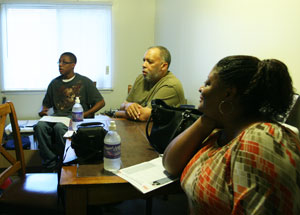
Jaleel, Franklin and Renell. PHOTO: PAUL STEPHENS/NEWS 21
The traditional public schools have recently proven more tolerant of Jaleel after the family had no guidance from Cesar Chavez School on how to find a new school to attend for the rest of his year.
But this summer, the family enrolled Jaleel in the Sharpe Program at Ballou Public High School in Anacostia, which educates students who are studious but require additional attention. The program is a small part of the public high school where Jaleel’s mother was initially reluctant to send her son. Jaleel takes English and math during the day and stays after school for a graphics club in the evening.
At this point, the family believes its best out of many non-ideal options is to send Jaleel to a different charter school, one that they hope is more willing to give him a special education.
Filed Under: Reshaping Communities • Washington, D.C.
About the Author:




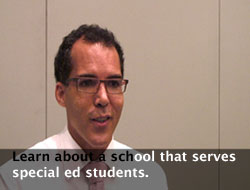

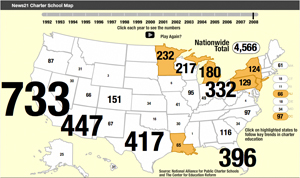

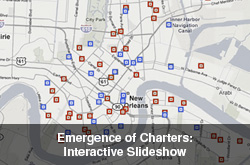








I really do hope that Jaleel made it back to the school. I know a lot of students who just vent their frustration against teachers and teaching staff but don’t really mean it. It is just a thing they do at that age and they should be forgiven.
thank you share with me . Hi!
Usually when i see a blog i read through it and move on, however yours was trully a great 1, i thought i would take the time to give you thanks for such a good blog post.
thank you share with me
I found your blog searching bing for phones sites and came across your website.
Good post, I look forward to the rest
Hi!
Usually when i see a blog i read through it and move on, however yours was trully a great 1, i thought i would take the time to give you thanks for such a good blog post.
[...] charter school student who was expelled — and fought back. (Via NYC [...]